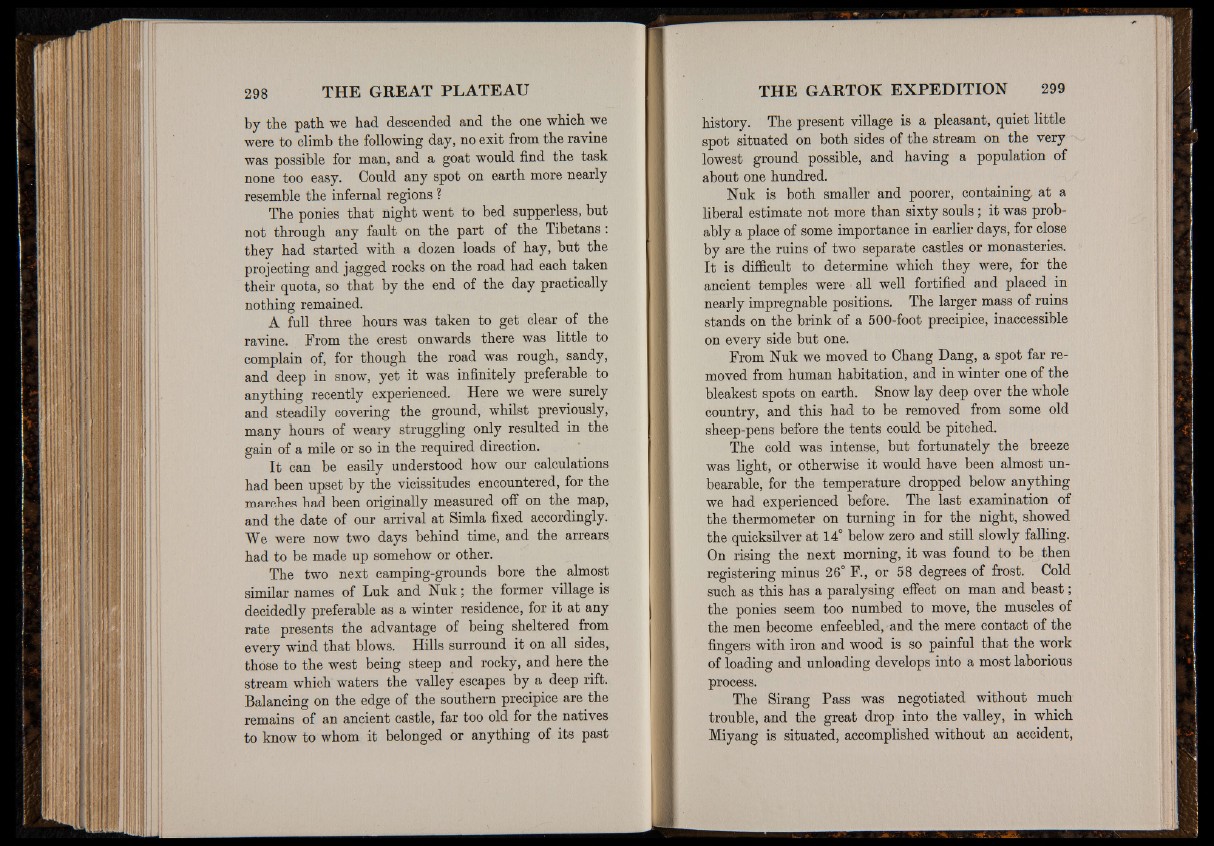
by the path we had descended and the one which we
were to climb the following day, no exit from the ravine
was possible for man, and a goat would find the task
none too easy. Could any spot on earth more nearly
resemble the infernal regions ?
The ponies that night went to bed supperless, but
not through any fault on the part of the Tibetans :
they had started with a dozen loads of hay, but the
projecting and jagged rocks on the road had each taken
their quota, so that by the end of the day practically
nothing remained.
A full three hours was taken to get clear of the
ravine. From the crest onwards there was little to
complain of, for though the road was rough, sandy,
and deep in snow, yet it was infinitely preferable to
anything recently experienced. Here we were surely
and steadily covering the ground, whilst previously,
many hours of weary struggling only resulted in the
gain of a mile or so in the required direction.
It can be easily understood how our calculations
had been upset by the vicissitudes encountered, for the
marches had been originally measured off on the map,
and the date of our arrival at Simla fixed accordingly.
We were now two days behind time, and the arrears
had to be made up somehow or other.
The two next camping-grounds bore the almost
similar names of Luk and Nuk; the former village is
decidedly preferable as a winter residence, for it at any
rate presents the advantage of being sheltered from
every wind that blows. Hills surround it on all sides,
those to the west being steep and rocky, and here the
stream which waters the valley escapes by a deep rift.
Balancing on the edge of the southern precipice are the
remains of an ancient castle, far too old for the natives
to know to whom it belonged or anything of its past
history. The present village is a pleasant, quiet little
spot situated on both sides of the stream on the very
lowest ground possible, and having a population of
about one hundred.
Nuk is both smaller and poorer, containing, at a
liberal estimate not more than sixty souls ; it was probably
a place of some importance in earlier days, for close
by are the ruins of two separate castles or monasteries.
It is difficult to determine which they were, for the
ancient temples were all well fortified and placed in
nearly impregnable positions. The larger mass of ruins
stands on the brink of a 500-foot precipice, inaccessible
on every side but one.
From Nuk we moved to Chang Dang, a spot far removed
from human habitation, and in winter one of the
bleakest spots on earth. Snow lay deep over the whole
country, and this had to be removed from some old
sheep-pens before the tents could be pitched.
The cold was intense, but fortunately the breeze
was light, or otherwise it would O " have been almost u%nbearable,
for the temperature dropped below anything
we had experienced before. The last examination of
the thermometer on turning in for the night, showed
the quicksilver at 14° below zero and still slowly falling.
On rising the next morning, it was found to be then
registering minus 26° F., or 58 degrees of frost. Cold
such as this has a paralysing effect on man and beast;
the ponies seem too numbed to move, the muscles of
the men become enfeebled, and the mere contact of the
fingers with iron and wood is so painful that the work
of loading and unloading develops into a most laborious
process.
The Sirang Pass was negotiated without much
trouble, and the great drop into the valley, in which
Miyang is situated, accomplished without an accident,